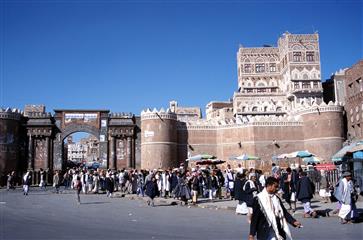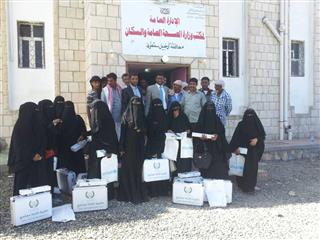

Worldwide Services
Yemen


Report Activities 2022 and 2023

Report of activities in 2022
On 2 April 2022, a temporary ceasefire was agreed upon between the Houthis and the Kingdom of Saudi Arabia. This ceasefire was extended twice. Moreover, on April 7, Hadi, Yemen’s interim president who has lived in Saudi Arabia since 2015, ceded his executive powers to a presidential council of eight prominent Yemeni politicians, both northerners and southerners.
Although the ceasefire was not renewed in October, and the blockade was not completely lifted, food and fuel have arrived via the seaport of Hodeidah, resulting in well filled shops in Sanaa and other cities. Unfortunately the prices are so high, that many poor people cannot afford to buy the needed food for themselves and their families. The city of Sanaa is teeming with beggars, while many children go about barefoot.
Also the airport of Sanaa has partially reopened. Some people have been allowed to fly out for much needed medical treatment abroad, like cancer treatment.
Report of activities in 2023
There were peace negotiations between Saudi and the Houthis, and also between various other factions. Although peace was not a done deal yet, and occasional skirmishes still took place, there was hope for a lasting settlement.
The attack on Israel of October 7 by Hamas, and the following war on Gaza, have not only brought untold sufferings on many innocent civilians, but have also influenced various alliances in the Middle East.
Although a peace agreement between Saudi and the Houthis seemed imminent, at present the process is on hold.
Because of the increased instability in the Middle East, Worldwide Services is not yet considering re-entry in the country.
The Jumhuri Hospital in Saadah, where Worldwide Services personnel provided medical care for many years, is still functioning, according to reports of Yemeni workers in the hospital.
News

A group of young new midwives, all from Socotra, have just finished their three years training in Mukalla. From the Director of Health of Socotra they all received a complete set of instruments for the purpose of home deliveries.



Yemen is one of the oldest centers of civilization in the Near East. Its capital and largest city is Sana'a. Yemen's territory includes over 200 islands, the largest of which is Socotra, about 354 km (220 mi) to the south of mainland Yemen. It is the only state in the Arabian Peninsula to have a purely republican form of government. Yemen was the first country in the Arabian peninsula to grant women the right to vote. Yemeni unification took place on 22 May 1990, when North Yemen was united with South Yemen, forming the Republic of Yemen.
The majority of Yemen's population is divided into tribal groups, especially in the northern areas of the country where 85% of local residents belong to various tribes. There are also small groups of peoples of Turkish/Ottoman origin in urban areas. Roughly 66% of the population are Sunni Muslims following the Shafi'i school while 34% adhere to the Zaydi Shia branch of Islam with small minorities of Ismali Muslims.
A Shia rebel movement, the Houthis, emerged in the early 2000s, claiming it would fight against what it saw as the marginalization of the Shi’ites of the Zaydi sect, which prevails in the Yemeni highlands.